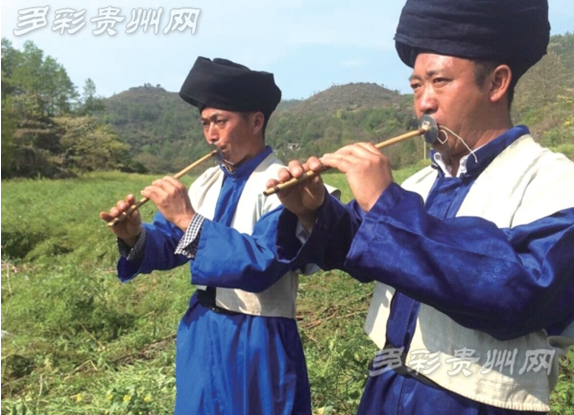Music from a weapon
It's a mournful, distressing melody lingering on the air which Wang Xingshu is producing with his Qiangdi, a pipe instrument that actually comes from a weapon and which used to be quite prevalent in the city of Anshun, Guizhou province, but now faces an uncertain future, with fewer than 30 people who can play it and even those already in their later years.
 |
|
Wang Xingshu and Wang Xinkui performing on the Qiangdi. [Photo/www.gog.cn] |
It takes hours on a rough bus to get to the village of Balang, near Anshun, with its magnificent mountains and several hundred members of the ethnic Miao group, a place which, Wang says, his ancestors fled to after failing in a war to hide from the enemy. The Chinese character "lang" in its name, was created by ancestors and cannot be found in a modern Chinese dictionary.
The unique pipe has been handed down for generations and has a thousand-year history and is unique to the area because no one anywhere else knows how to play it, even in villages nearby. In fact, the Qiangdi originated in the distant past as a weapon, which, Wang explains,"allowed a warrior to kill someone immediately", by blowing a cartridge that could be fatal at a short distance. The ancestors adopted two pipes to increase its deadliness and accuracy in the many wars of that time.
Zhu Xingkui, another villager who can play Qiangdi, elaborates,"In the past, a copper pipe was used rather than the later bamboo," and the weapon gradually became a musical instrument because it made a fancy sound after some changes and improvements. A closer look at the instrument shows that it consists of two flutes, with 16 holes in all, seven at the front of each flute and one in the back.
Wang Xinshu and Wang Xinkui know thousands of melodies that have been handed down in orally, without any written scores for reference but they are as full of grief as any story. And it was only through the melody of the Qiangdi that they could escape their sorrow over the loss of families. Understandably, the villagers prefer playing the Qiangdi in the tranquil night air.
"In the middle of the night, the melodies can be heard lingering in the mountains," Zhu adds, explaining that he sits in front of his house facing the dark mountain to play to express his emotions.
Wang Xingshu and Wang Xingkui are the two main promoters of the continued use of the Qiangdi, and they note that the bamboo used for it should be no more than 3 centimeters in diameter and more than 40 in length with a bamboo joint and black bamboo is the only species that meets the requirement.
"We used to find black bamboo in the mountains, but now we plant it in the village," Wang Xingshu said,"but as time goes by people are losing their interest in learning how to play it. In the past, 90 percent of the villagers could play, but now no more than 30."
When Wang Xingshu wanted to find out why, he discovered that most of the younger generation go out to look for jobs and the Qiangdi brings no financial rewards.
He concludes by saying in a disappointed tone,"This situation may spell disaster for the Qiangdi."















